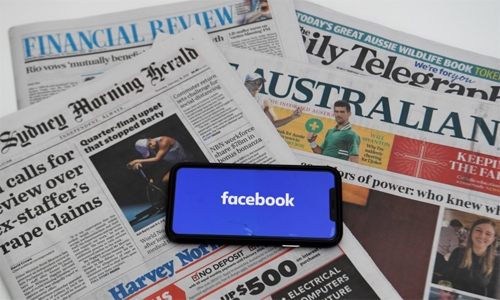Facebook blocking Australians from news in media law spat
Agencies | Sydney
The Daily Tribune – www.newsofbahrain.com
Facebook announced on Wednesday that it will no longer allow news articles to be viewed or shared on its platform in Australia because of a contentious new media law under consideration.
The US technology giant said Australian publishers are now "restricted from sharing or posting any content," while content from international outlets can no longer be accessed or shared by Australian audience, Deutsche press agency (dpa) reported.
Australian users will not be able to share or view Australian or international news content.
The escalating dispute stems from the News Media Bargaining Code, a legislative proposal introduced into Australia's parliament in December.
It would require Facebook and Google to negotiate with news outlets for payment for their content or face fines.
"The proposed law fundamentally misunderstands the relationship between our platform and publishers who use it to share news content," Facebook said in a statement.
"It has left us facing a stark choice: attempt to comply with a law that ignores the realities of this relationship or stop allowing news content on our services in Australia. With a heavy heart, we are choosing the latter."
Facebook went on to argue that Australian publishers benefit from sharing their stories.
"The value exchange between Facebook and publishers runs in favour of the publishers," it wrote, saying its platform generated 5.1 billion referrals to Australian publishers. It claimed the referrals were worth an estimated 407 million Australian dollars (315 million US dollars).
Facebook first made threatened to ban news for Australians in August last year and repeated the ultimatum before a Senate inquiry in January.
The company also blocked satirical pages including the popular 'Betoota Advocate' and some government pages including state health pages which provide important coronavirus updates and the Bureau of Meteorology, which provides disaster updates.
Some police, firefighters and other government pages were also blocked.
Facebook later said it would restore the pages, and claimed it didn't intend its news ban to impact government pages.
"The actions we are taking are focused on restricting Australian publishers and people in Australia from sharing or viewing Australian and international news content," it said in a statement.
"As the law does not provide clear guidance on the definition of news content, we have taken a broad definition in order to respect the law as drafted. However, we will reverse any pages that are inadvertently impacted."
Treasurer Josh Frydenberg strongly criticized Facebook's move.
"Facebook's actions were unnecessary, they were heavy-handed, and they will damage its reputation here in Australia," Mr Frydenberg told reporters in Canberra on Thursday.
"Their decision to block Australians' access to government sites - be they about support through the pandemic, mental health, emergency services, the bureau of meteorology - were completely unrelated to the media code."
Last month Google threatened to pull its search engine from Australia if the law went into effect.
The Australian Competition and Consumer Commission developed the code and it has been endorsed by Prime Minister Scott Morrison.
After Google said it could leave the Australian market, Morrison defended the proposal by saying that "Australia makes our rules for things you can do in Australia."
"That's done in our parliament. It's done by our government. We don't respond to threats."
Google has struck deals with Rupert Murdoch's News Corp, Seven West Media and Nine Entertainment, and is in talks with public broadcasters ABC and SBS, as well as Guardian Australia, news agency AAP reported.
The media bargaining code is before the Senate after clearing the lower chamber of parliament.
The legislation, which is expected to pass, would give the treasurer power to choose which companies are subject to it.
A panel - decided by the negotiating parties or the media watchdog - would hear offers and make a decision on payment for news content.
Related Posts

